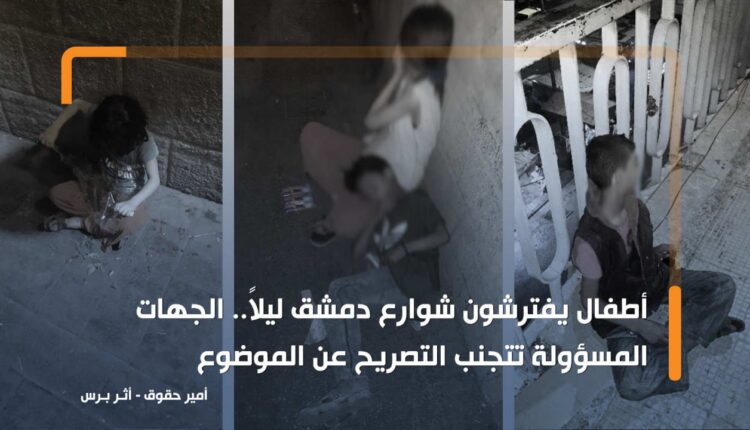The scene of children navigating the streets, sidewalks, and bridges of Damascus has sadly become a common sight for the city’s residents. This grim reality has persisted for over 12 years, leaving behind hundreds of displaced children. The absence of a clear government mechanism to address this issue is a matter of concern, as it could have detrimental consequences for Syrian society in the future.
A correspondent from Athr Press in Damascus recently engaged in conversations with some of these children, delving into why they find themselves sleeping on the streets, the whereabouts of their parents, and how they manage to survive in the midst of the challenging economic conditions the country is currently grappling with.
One such child, Ghazal, was found holding her sister tightly on one of the streets of old Damascus. She revealed to Athr Press that their father had passed away, and their mother had remarried and left them. Now, they reside with relatives and earn their livelihood by selling biscuits. When asked about the reason for sleeping on the street, she responded with an air of indifference, “If it gets too late and we can’t make it back to Jaramana, we sleep here. That’s what happened to us today.”
Ghazal also shared her concerns about sleeping on the street, saying, “Sometimes, passers-by disturb us or spray water on us, and they hurl hurtful words at us. Our relatives don’t seem to care about us sleeping on the street, so if we don’t sell our entire stock, we can’t enter the house.”
Another child, Walid, who used the walls of one of the capital’s bridges as his makeshift pillow at midnight, confided in Athr Press that his father is gravely ill and hospitalized. He doesn’t know the whereabouts of his mother and siblings, so he resorts to begging to acquire medicine for his father.
Then there’s Sham, a child who sells roses in the alleys of Qaimriya. She explained to the Athr Press reporter that she has no knowledge of her family’s whereabouts. She works alongside a group of children, selling roses, and whoever distributes roses to them doesn’t allow them to return every night. Consequently, they find themselves sleeping on the sidewalks. Those who fail to sell their entire batch of roses are deprived of both food and sleep. Sham refused to disclose the name or location of this person out of fear.
Tossing responsibilities:
Engineer Imad al-Ali, the General Supervisor of the Services Complex in Damascus Governorate, clarified to Athr Press that the governorate does not have a direct role in addressing this issue. Instead, it falls under the jurisdiction of the Ministry of Social Affairs and Labor, as well as various humanitarian associations.
In pursuit of further information, Athr Press contacted the Ministry of Social Affairs and Labor to inquire about child homelessness and begging. However, it was revealed that both matters had been transferred by the Ministry to the Syrian Commission for Family Affairs.
Subsequently, Athr Press reached out to the Syrian Commission for Family Affairs, only to be surprised that the issue was referred back to the Ministry of Social Affairs. After revisiting the ministry, Athr Press was informed that the Commission is actively addressing this phenomenon but has not concluded its efforts. Consequently, they were unable to provide a permit. It’s worth noting that these attempts span over a month, and as of now, there is still no response.
It is worth highlighting that the correspondent from Athr Press has observed numerous instances of children inhabiting sidewalks and gardens, particularly in the streets of old Damascus and the gardens of al-Thawra Street, often evading any attempts at dialogue or photography.
This article was translated and edited by The Syrian Observer. The Syrian Observer has not verified the content of this story. Responsibility for the information and views set out in this article lies entirely with the author.


